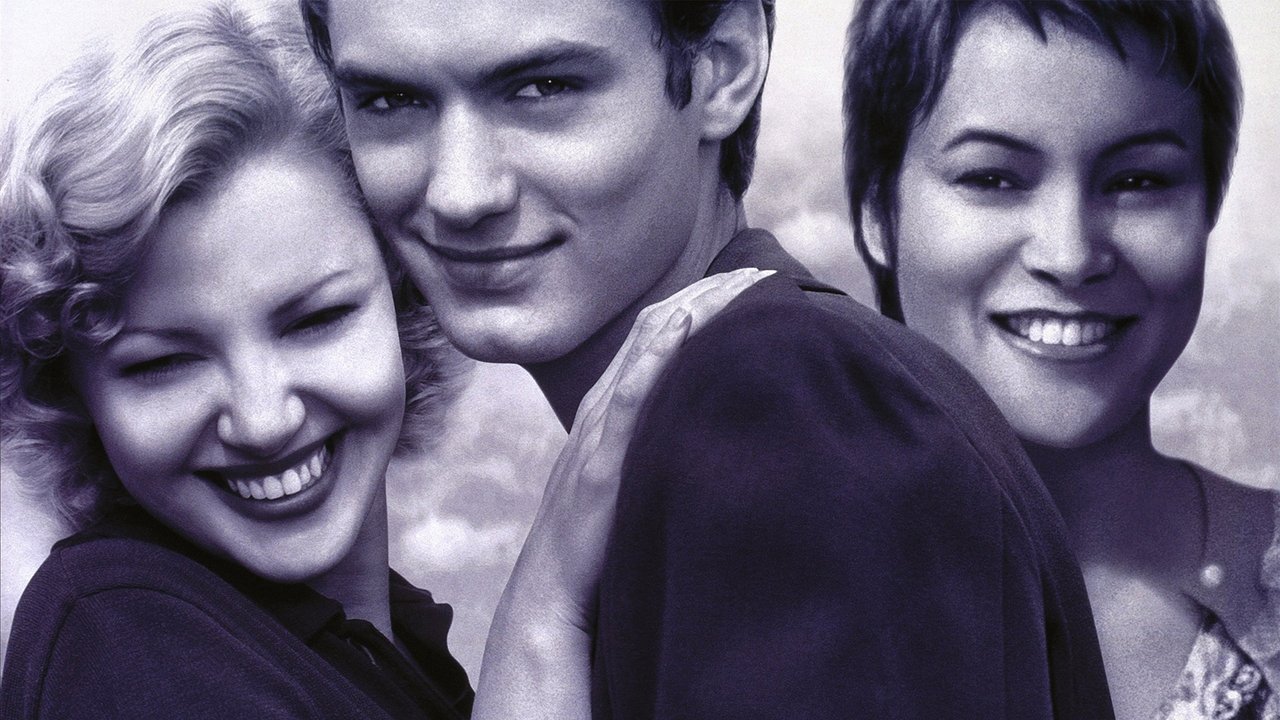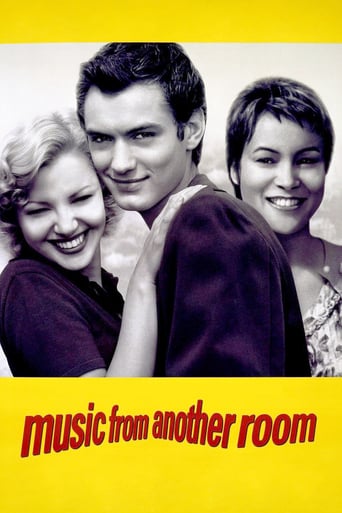Pluskylang
Great Film overall
Phonearl
Good start, but then it gets ruined
Teringer
An Exercise In Nonsense
Ezmae Chang
This is a small, humorous movie in some ways, but it has a huge heart. What a nice experience.
Wizard-8
"Music From Another Room" was one of the last movie to come out of Orion Pictures. They were so far gone when this movie was finished that they didn't even release it to theaters. Though that's probably for the best, because I can't see an audience for this loser. It's a cheaply-made affair, with sets and other production values making this look like a made for television movie. The movie also has a very low key feeling. While this is better than being strident, it also mutes a lot of the emotions the characters are trying to express. But there's a bigger problem with the two lead characters, and that is that they are not very likable. They are kind of dumb and seldom show a sympathetic side to themselves. Strangely, the subplot concerning the heroine's blind girlfriend finding romance works a lot better. It's kind of clunky, but these scenes show enough charm that you'll wish the movie had focused on those characters instead of the Judd Law and Gretchen Mol characters.
Subhamoy Sengupta
When I check my voting history, I see I have voted for movies rather generously. But I never actually gagged to give a movie a 9 and felt inhibited not to go beyond 7. I wish this movie let me love it a little bit more.The story is very simple and popular. Actually, in my country, at least a dozen movies are made every decade on a plot like this one. So, it's not the catchy story or an end twist that people love these kinda movies for. So, when you already know what is gonna happen and how, complete attention falls on things like cinematography and compelling conversations.This movie has wonderful moments. Well, with Jude Law, that is no surprise. I wanted to see this movie for Gretchen Mol. She is spontaneous, but not brilliant. The thing is, for this movie, she did not have to be. But when a sensitive viewer is watching the film, certain things should be left unsaid for his mind to synthesize and derive. If everything is discussed on a round table (not literally), it becomes more educational and less charming. That is what is pulling this movie down. Movies like French Kiss or Addicted to Love never surprised any viewer with a climax. But those films took their breaths away no doubt. I wish this one was a little more subtle and metaphoric. That way, I would not have to settle for a 7.Though there is no surprise in the end, the end is very beautiful. Feels like it's filmed by some different director than the one who filmed the educational speeches. But anyway, this is a lovely film to see. You might find it very good, or just good, depending on how forgiving you are in real life. There is no way you are gonna regret spending your good money on it. I recommend it. Who am I to recommend? You don't wanna know.
gradyharp
MUSIC FROM ANOTHER ROOM was written and directed by Charlie Peters: the film script would benefit from some judicious editing. Yet as a light love story it is fast moving despite diversions in the plot and in general gives some fine actors good screen time.Danny (Jude Law) as a five-year-old lad assisted in the complicated birth of his friend Grace Swan's (Brenda Blethyn) child Anna (Gretchen Mol) and at that moment declared he would marry Anna someday. Twenty five years later Danny returns to Los Angeles from his home in England and encounters the mature Anna who is now engaged to Eric (Jon Tenney), falls in love, returns to the neighbor family of his childhood where Grace greets him with effusive warmth. The family is a dysfunctional one: Anna's sister Nina (Jennifer Tilly) is blind and dependent on Anna; brother Billy (Jeremy Piven) is married to suicidal Irene (Jane Adams); cynical feminist sister Karen (Martha Plimpton) is a man-eater; and the father cares for Grace as she is stricken with a terminal illness. Anna resists Danny, but Danny's influence on the family is like 'music from another room', and results in positive changes in each of the family members: Nina finds love with Jesus (Vincent Laresca), a kitchen worker who introduces Nina to dancing, love, and independence; Grace opens her longing for Anna to experience passion instead of just caring for everyone; and the concept of fate and love and passion is stirred vigorously.Jude Law is his usual appealing self and makes his role credible. Jennifer Tilly does a fine job realizing Nina and her transformation, and Brenda Blethyn gives us a heady dose of Brenda Blethyn, which is always welcome. There are many problems with the film, the most significant one being Gretchen Mol who doesn't take her character beyond paper doll and certainly doesn't seem an adequate reason for Jude Law's unswerving attention. But as a film it works well enough and does provide some food for thought about the true meaning of love. Grady Harp
jkopel
The pivotal birthing scene is absolutely ridiculous and inaccurate. I caught the last half of the movie on cable and liked it very much. Then I watched it from the beginning and the film was ruined for me. For the record, I am an obstetrician. Although a cord around the neck (nuchal cord) can cause fetal distress in labor it will not impede birth. A cord around the neck cannot be diagnosed by palpation until after the baby's head is delivered. Although a hand could be passed into the uterus to palpate such a cord it would be extremely painful to both the woman in labor and the person doing the exam. Such intra-uterine techniques were used prior to the twentieth century and required extreme strength on the part of the accoucher (birth attendant) and took a long time to complete and were fraught with danger. They are simply NOT used in modern day obstetrics.

